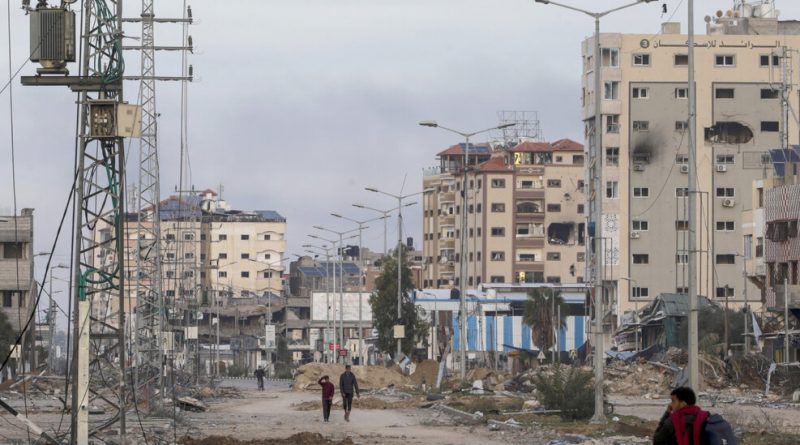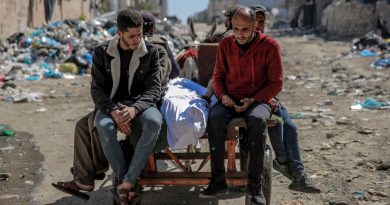Israel-Hamas War: Fighting Eases in Northern Gaza, Giving Residents Some Relief

A member of Israel’s war cabinet exposed deep rifts in the group, criticizing the prime minister in a television interview broadcast on Thursday, and dismissing the possibility that the Israeli military might rescue more hostages while saying bluntly that Israel had yet to fully realize its objectives in Gaza.
The cabinet member, Lt. Gen. Gadi Eisenkot, told Uvda, an Israeli news program: “We didn’t topple Hamas.”
“Today,” he added, “the situation in Gaza is such that the war aims have yet to be achieved.” General Eisenkot, a retired military chief of staff, is a nonvoting member of Israel’s five-person war cabinet, which has been making many of the most important decisions related to the fight in Gaza. He joined Israel’s emergency wartime government, led by Prime Minister Benjamin Netanyahu, from an opposition faction after the devastating Hamas-led terror attack on Oct. 7.
General Eisenkot has also paid a devastating personal price in the war: His 25-year-old son, Master Sgt. Gal Meir Eisenkot, was killed while fighting in Gaza last month, as was a nephew.
But tensions have persisted in the emergency government, and the rare interview with one of the war cabinet members spilled some of them out into the open.
Mr. Netanyahu has insisted that Israel is steadily working toward eradicating Hamas and remained focused on freeing the hostages, even as Israeli forces draw down their presence in the enclave.
In the televised interview, which was prerecorded, General Eisenkot said Mr. Netanyahu carries “sharp and clear” responsibility for the country’s failure to protect its citizens on Oct. 7. Mr. Netanyahu has generally avoided joining other top officials in taking responsibility for the disastrous attack and its aftermath, saying that the time to investigate the failures would come after the war.
The general also said that Israel’s leaders must focus on defining a vision for how to wind down Israel’s war in Gaza, and for its desired outcome. The call to plan for the war’s aftermath stood in contrast to statements by the prime minister and many other Israeli officials: Mr. Netanyahu said Thursday that the war would last for many more months.
Asked whether Mr. Netanyahu — who’s governing coalition pushed for a divisive judicial overhaul before the war — sought to drag out the war as long as possible, General Eisenkot paused for several seconds, then said, “I hope not.”
He also emphasized Israel’s stated objective of returning the hostages who remain in Gaza, saying only a deal with Hamas could secure further releases. More than 130 people — roughly half of those kidnapped on Oct. 7 — remain captives, according to the Israeli authorities.
“For me, there’s no dilemma,” he said. “The mission is to rescue civilians, ahead of killing an enemy.”
Since the beginning of the conflict, at least 25 hostages have been killed in captivity, according to Israeli officials, including at least one in a botched rescue attempt. In December, soldiers misidentified three hostages as combatants and shot them dead.
Asked about a heroic rescue mission of the hostages along the lines of the Entebbe raid — when Israeli commandos saved the lives of 103 people aboard a hijacked plane in Uganda in 1976 — General Eisenkot emphatically said that would be impossible.
“It won’t happen,” he repeated, saying the hostages were scattered and mostly being held underground.
Only a deal with Hamas would free them, and anyone saying otherwise, General Eisenkot said, was “selling tall tales to the public.”
General Eisenkot touched on one of Israel’s central dilemmas: whether it should continue to pummel Hamas while risking the lives of the hostages or agree to a cease-fire in exchange for their freedom.
Throughout the hourlong broadcast of the interview, he appeared to come down on the side of making such a deal to liberate the hostages — even if Israel had to accept a longer truce with Hamas.
He said he thought every effort should have been made to keep the temporary cease-fire intact last November — during which groups of hostages were released daily — because it would be difficult to achieve a similar arrangement a second time.
The general also discussed Hezbollah, the powerful Iran-backed militia in Lebanon that Israel has clashed with on an almost daily basis since the beginning of the war. Early in the war, Israeli officials weighed whether to launch a pre-emptive strike against Hezbollah — risking a two-front war that deeply concerned U.S. and Israeli military planners.
General Eisenkot said that he believed his party’s presence in the emergency government prevented a full-blown war with Hezbollah, which he said would have been “a very grave strategic mistake.”
“We would have fulfilled Sinwar’s strategic vision to immediately bring about a regional war,” General Eisenkot said, referring to Yahya Sinwar, the top Hamas leader in Gaza.
Toward the end of the broadcast, the general spoke about the shaken state of public confidence in the Israeli government and urged that there be a new election — though Mr. Netanyahu’s coalition of right-wing parties still holds a majority in Parliament outside the emergency government, giving it influence over when any election might take place.
The Israeli public must head to the polls “within months,” General Eisenkot said. Although elections might harm the country’s wartime unity, “the Israeli public’s lack of faith in its government is no less dire,” he said.
“On the one hand, you want to be united in the face of the enemy, for the sake of the soldiers who are fighting,” he said. But “Israel is a democratic state that needs to ask itself after such a grave event how it continues from here with a leadership which has failed so completely.”
Source – NY Times




